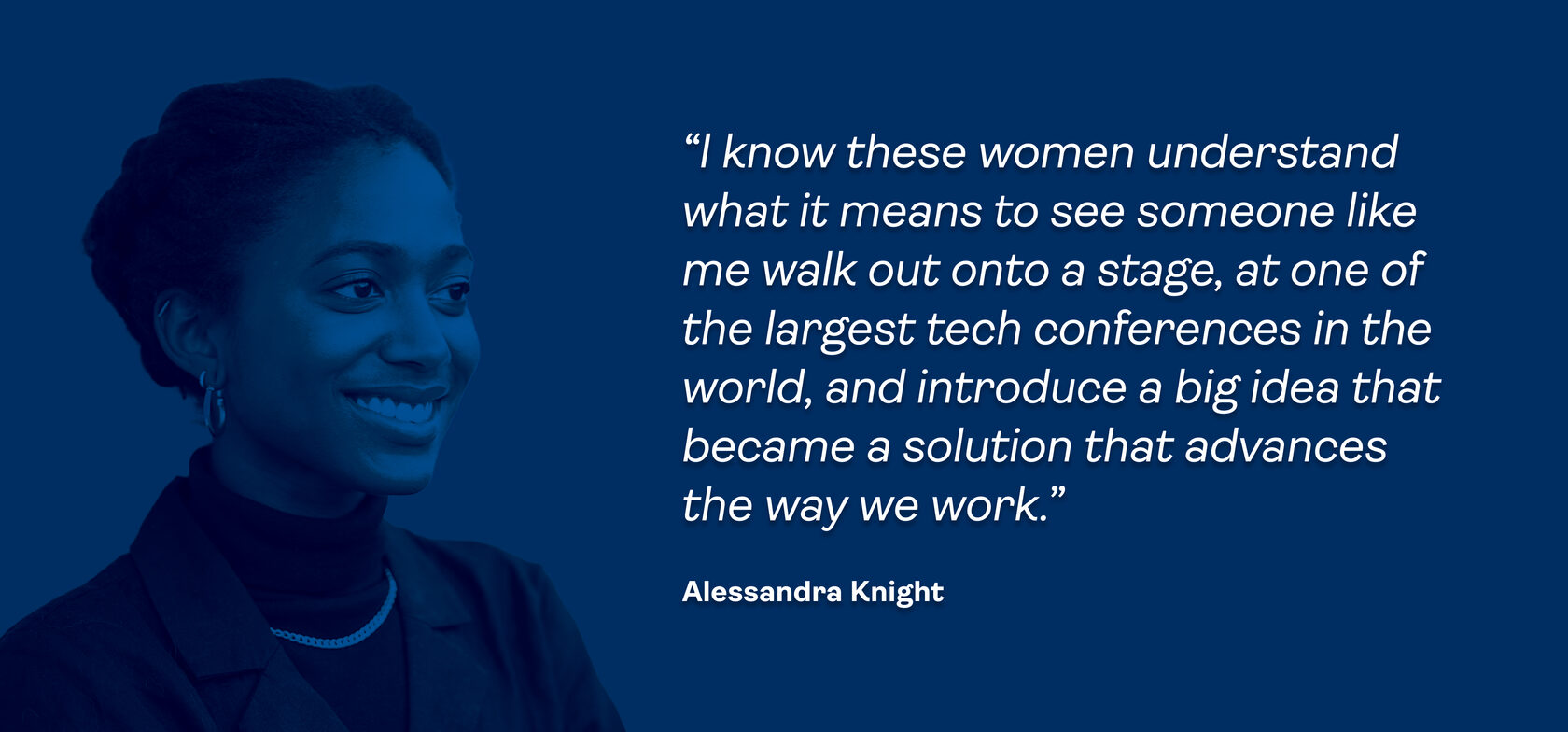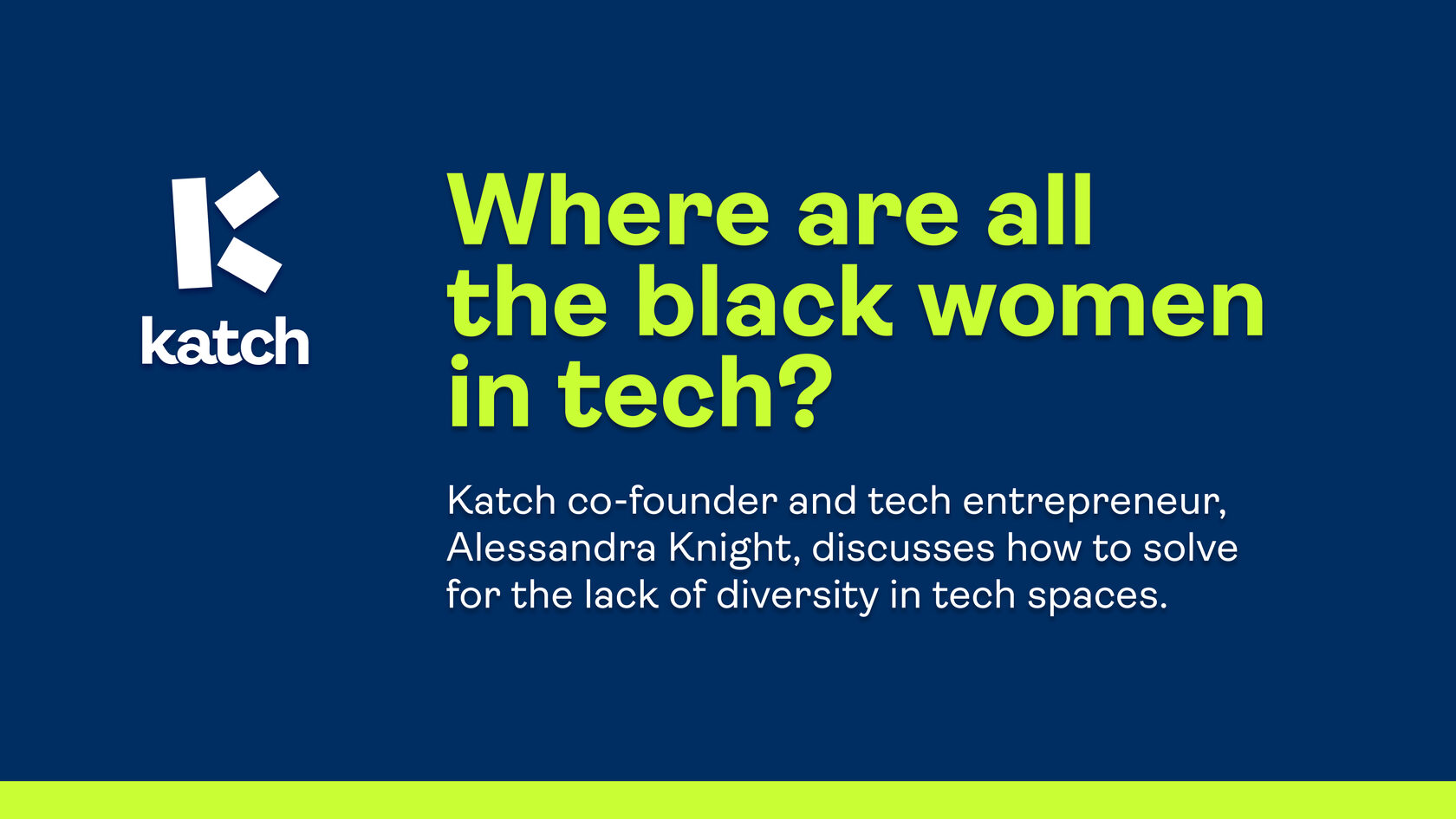While I believe most of these have had good intent, some are more authentic and effective, than others. The current approach to implementing DEI goals: tackling bias, expanding pipeline to seek out more diverse talent, and culture change haven’t made significant enough waves.
In fact, 18% of employers in software and tech are making DEI training mandatory, however, less than half are working to ensure fair consideration of all employees for promotions and pay increases.
And when it comes to women in tech, especially Black women in tech, there aren’t many of us. I know because as I’ve climbed the tech ladder, nearly every new room I find myself in there is no one that looks like me – it’s homogeneously white and male.
But what I will say about this climb, is that I feel extremely fortunate to have had so many people in my corner, supporting me through my entire journey. I want to do that for others because I love this industry, and I want girls and women of color to feel the pride and joy that I feel.
I know these women understand what it means to see someone like me walk out onto a stage, at one of the largest tech conferences in the world, and introduce a big idea that became a solution that advances the way we work.
But that’s just the start. It’s time for Black and brown women and people to become leaders in tech, and it’s time for those of us at the top to intentionally foster their growth.
Finding Myself in Tech
It is funny to think back to when I was much younger in my career. I try to imagine where I thought I might be, what my journey was going to look like. I had dreamed of being a doctor - that’s what my aunt did. I would’ve never thought it would’ve landed me here, in tech. I mean, after all, who would I have looked to and said, “That’s her – that’s the woman I want to become”?I’d never seen anyone like me before.
Beginning with Dots and a few other startups and before stepping into my role as co-founder and CEO at katch, a space I also never thought I’d end up in since I’m not what you might call very “techy”, I was given the opportunity to learn as much as I possibly could about how to lead companies by engaging with their stakeholders and understanding how their decisions impacted the organizations they oversaw.
And while working in tech and not being “technical” presents its own challenges, I very clearly understand the need to see more women, similar to myself, in this space.
The tech ecosystem is broad and there’s a lot that goes into the makings of a successful company – one of which is diversity; diversity of race, diversity of experience, diversity in background and socioeconomic status, diversity in sexual orientation, diversity in gender, among the many other forms that diversity comes in - ultimately, leading to diversity of thought.
One thing my role has opened my eyes to is that of the various positions that exist in tech companies, we need to fill them with different perspectives to best consider the end user, their experiences, how to solve for them, and to succeed.

The Broken Rung in Tech Workplaces
Reflecting back on a packed week of collaborations and discussions at Web Summit, I’ve felt the grand impacts of what it means to have a seat and voice at the table – and how young women today have many, many more role models to look up to than I did. But we still have a lot of work ahead of us, despite the foundation for change being laid.In my quest to understand what’s splintered when it comes to diversifying the tech space, I’d found a lot of research about something called the “broken rung” or this seemingly invisible barrier keeping women of color from entering positions in tech, especially leadership positions, because they aren’t even getting a foot in the door for entry-level jobs.
What I found is that women are extremely underrepresented in computer science-related jobs, accounting for only 25% of the total workforce. When it comes to software engineering, the numbers are even worse, adding up to only 14% of the total workforce. And when you drill down to what the means for Black or brown women, the numbers become even more dismal.
So, it’s this broken rung or what you might even call a locked door that places women at such a disadvantage for not only being able to enter the tech workforce but working their way up into senior and leadership positions so that they can look at a broader market place that includes women and women of color.
Repairing the Rung, Opening the Doors
I believe it’s essential that we build more awareness around the issue of diversity in tech, women in tech, and diverse women in tech and intentionally not only create the opportunities for them to enter these spaces but welcome them.Too often, industries cycle through the same pipeline, tossing any form of inclusion and equity aside and very egregiously losing out on the insight and creativity these women bring to tech advancements and solutions.
Make space
Consider an internal audit of your team and determine where there are opportunities to embrace additional diversity in background, culture, and opinion, as this helps to create a much richer product. Take an honest assessment of how a diverse team can help propel your organization despite your fears.Inclusion matters, and that’s a fact
When prospective applicants are interested in a company, they want to see who makes up their leadership team, they visit our websites, they look at our branding, they want to see themselves – and rightfully so. Prospective employees are now scoring us based on our employment process and we need to be mindful of if we’re being intentional about making that process inclusive.As tech leaders we need to be empathetic
Being an underrepresented individual in the space is difficult. Tech senior leaders should be at the forefront of creating change, addressing diversity and inclusion concerns, putting in the real work to expand the pipeline for under-represented minorities, avoiding tokenism, and welcoming feedback. I wholeheartedly believe we win when we are in a state of mutual empathy — when everyone feels they belong.One approach that can help to begin to solve this problem is to be inclusive and open the doors of opportunity to some of our least represented groups. We need to incorporate mentorship programs for young women and people with the goal to engage and mentor them into tech career paths. It’s 2021 – you don’t necessarily need a tech degree to learn, practice in, and become great in the field.
katch’s Role in Equity
At katch, we’re building an inclusive and transparent organization - we care about our employees, and despite the fact that we’re still young, our intention is to create an environment where diversity of background is celebrated.My personal goal is to continue to bring on more and more innovators who will help expand our worldview because their ideas, experiences, and thoughts will lead the charge in that continuous evolution.
We believe in a flexible-remote work schedule not only to access the best talents from across the globe, but to help foster opportunity for that talent.
We’ve also seen the impacts flexible, remote work has on a workforce – It’s given our employees the space to work as their true selves, it no longer prioritizes the extrovert, and it allows them to manage both their home and work lives flexibly – everyone isn’t required to “clock-in” at a certain time, but rather is empowered to feel and be in control of their own productivity.
For my peers, I hope to continue to have conversations and roundtables that keep these important ideas and initiatives at the forefront of their approaches to leading and to encourage diversity within their companies and organizations to help create the support systems black and brown people need to succeed within their companies.
Interested in continuing the conversation? Reach out to me at Ale@gokatch.com.



